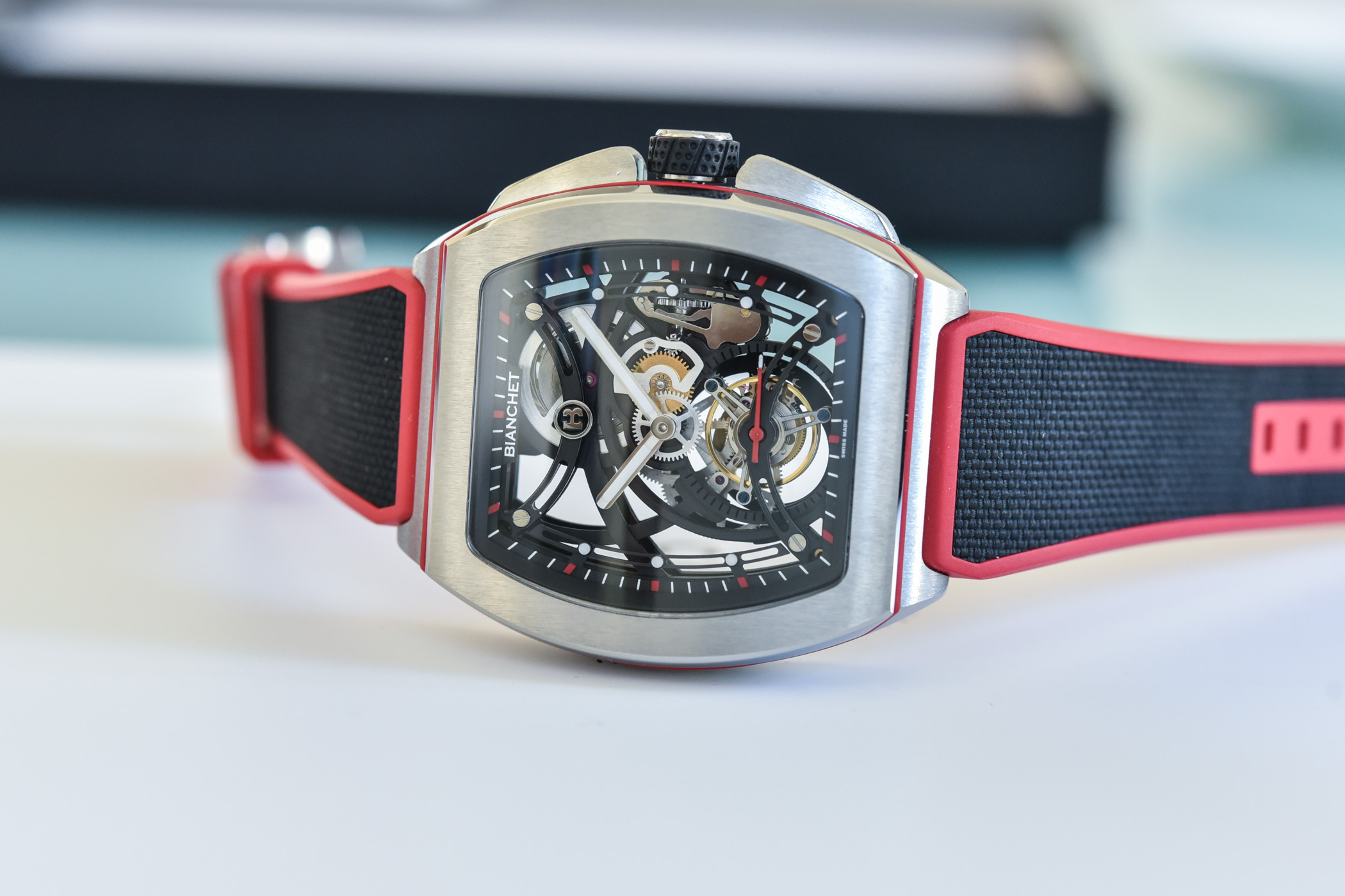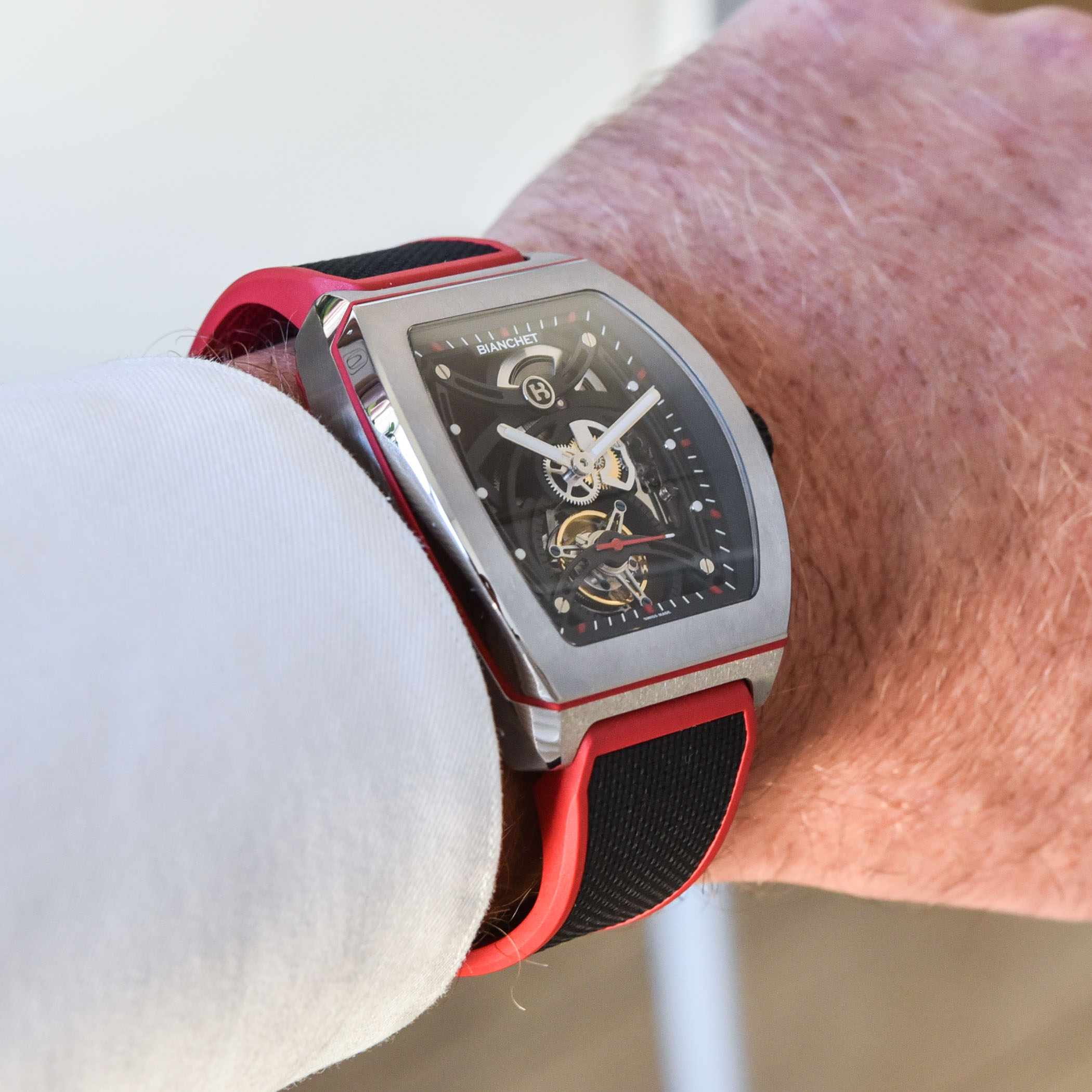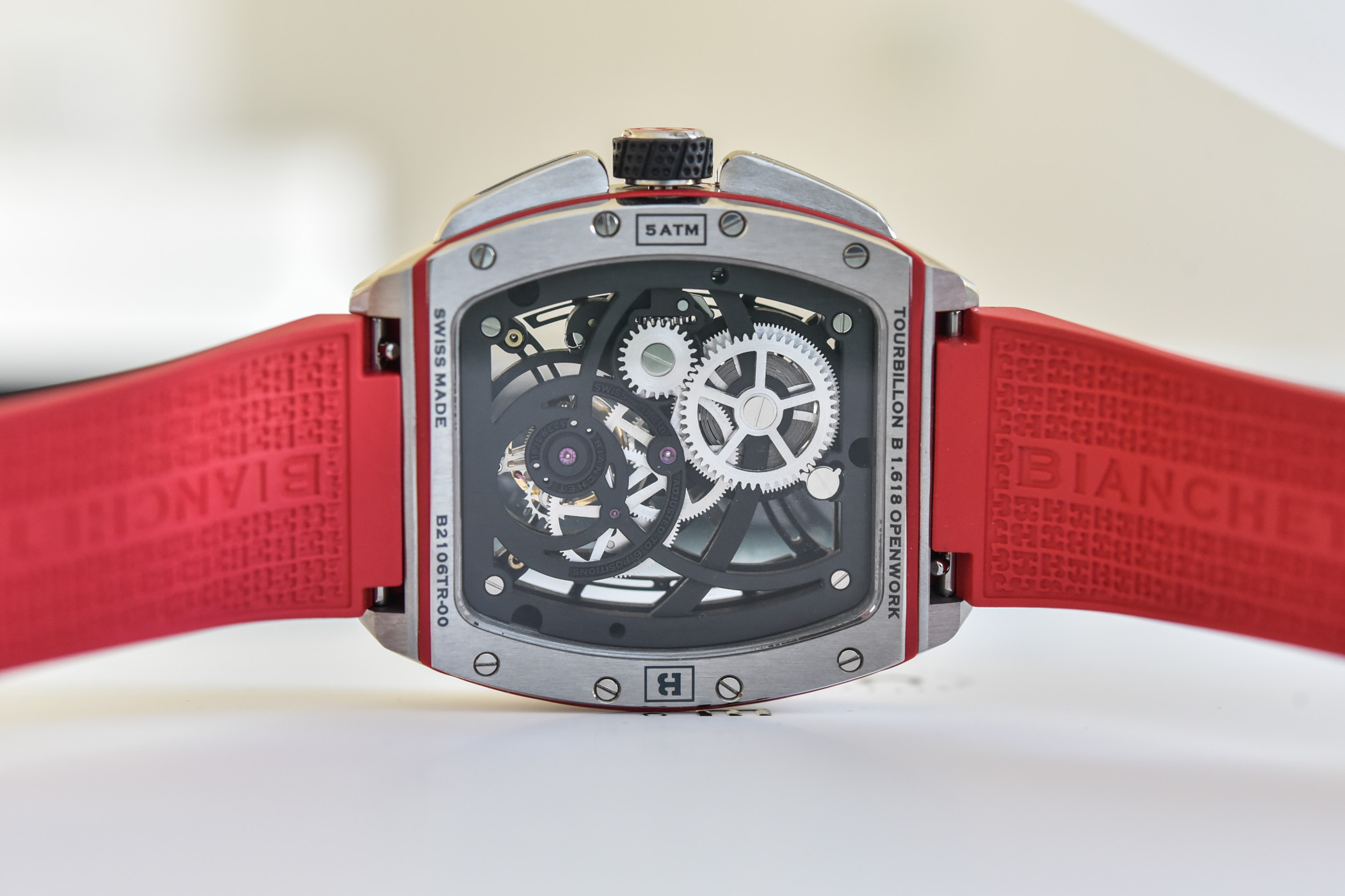The New Bianchet Tourbillon B1.618 Openwork
Sporty looks, openworked movement and tourbillon regulator.

Bianchet is a new horological independent watchmaker founded by Rodolfo and Emmanuelle Festa Bianchet, located in the Neuchatel area. Following a career in Fintech, the Festa Bianchet couple embarked on a new entrepreneurial project, following their passion and desire to create their own watches. On the occasion of the Geneva Watch Days, we were able to meet them and take a look at their first creation, the Bianchet Tourbillon B1.618 Openwork.
When presenting his first horological creation, Rodolfo Festa Bianchet immediately mentions his love for tonneau-shaped watches and his fascination for the work of the Italian mathematician Fibonacci and for the Golden Ratio (1.618). Their idea was to create a modern timepiece, applying the golden ratio to design not only the case (and its profile) but also the movement (shaping the different bridges).
The couple ended up creating the B1.618, an openwork sports tourbillon in a modern 43mm x 50mm tonneau case with colour accents catching the eye. The watch is 100% Swiss made and interestingly, they even acquired a CNC to make case prototypes, truly willing to learn the trade by doing… Presented as resistant to shocks of up to an impressive 6,000G, the Tourbillon B1.618 Openwork is offered in two limited editions of 21 pieces each.
The titanium version features red vulcanized rubber lines and a matching colour crown. The second version comes in a composite of carbon fibres and titanium particles that shimmer with their own reflections. It is highlighted with blue rubber lines and accents. With the metal used for the components and case, the titanium version weighs in at less than 55 grams. The carbon version weighs 33 grams without the bracelet. The water resistance is 5ATM/50m and 3ATM/30m respectively. Both watches come on an integrated vulcanized rubber strap extending the case curvature and closed with a grade 5 titanium pin buckle.
The hand-wound calibre is a skeletonized tourbillon featuring intertwined bridges whose shapes have also been inspired by the golden ratio. A proprietary movement, it was developed with Olivier Mory (BCP Tourbillons in La Chaux-de-Fonds). Ticking at 21,600 vibrations/hour, the balance wheel features adjustment weights. When the barrel is fully wound, the power reserve is of over 4 days at approx. 105 hours. The watch can be delivered with a COSC certificate upon request.
The Bianchet Tourbillon B1.618 Openwork comes with a 5-year warranty. Price is set at CHF 44,500 for the titanium version and CHF 46,500 for the carbon-titanium composite version (prices excl. taxes). Taking a look at these two first creations, it was hard not to think that these have “Richard Mille vibes”. But some of the Bianchet couple future projects we could see go in a quite different direction. For now, if you are looking for a sports Tourbillon, these would be interesting options to take a look at and go hands-on with, if only just to check it out in person.
For more information, please visit www.bianchet.com.










7 responses
An article from another source (available online) mentioned a launch price of 28,500 CHF ex taxes.
Is it the demand that drives the inflated price ? Is it worth 28,500 CHF or 46,500 CHF in your opinion ?
@Bastien… to my understanding the price they mentioned last year and in 2019, of around 28k CHF, was an estimate. The final price, now the watch is finally ready, is much higher indeed… and probably more realistic for building a brand.
This is way more then RM vibes, everything about this watch is a RM copy. The case you could looked past because many brands use it but that combined with the movement that heavily copies RM’s very distinct style is unmistakable. They can’t hide behind “the golden ratio”
You can get RM knockoffs for cheap from China, so why copy ? Bad idea, is my point.
The Tourbillon B 1.618 carbon open work is a Tonneau Shaped Skeleton watch,
We are aware that tonneau-shaped watches are less popular than round watches and easily compared one to another due also to the conditioning power of the Marketing of the Big Brands
However, our watch is an original design. The case is constructed based on a precise mathematical ratio or the golden ratio 1.618, widely used in design by Leonardo, Botticelli, and many Italian Renaissance painters to create Armonia, Equilibrio e Bellezza.In fact, the bezel is 0.618 of the middle case and the back is 0.618 of the bezel for a dimension of 6.5 mm of the Middle case 4mm of the bezel, and 2.5mm of the back which makes the 3 elements in relationship to each other in the golden ratio. To visually show this harmonic construction two inserts of rubbers have been inserted in the case which no other brand uses and are Bianchet’s distinctive signature.
The skeleton movement has also been designed based on the Fibonacci Spiral and this results in rounded lines of the skeleton movement which transmit a sense of depth and harmony contrary to all other tonneau skeleton movements that have sharp and aggressive angles.
In essence, this is our original interpretation of a tonneau shape skeleton watch based on a modern reinterpretation of the Golden ratio in contemporary watchmaking.
I don’t know about the Fibonacci one but they met the Richard Mille ratio for sure.
Wonder how the team feel about working on a clone.
I would like to answer some of the comments above , first stating that we respect each and every opinion, and in this spirit, we would like to express our own.
First the Tonneau shape was invented by Cartier in 1906. It became popular during the art-deco period, and was again famous in the 80’s thanks to Frank Muller, then it became the most popular watch of the super-wealthy thanks to the incredible technical innovation and design brought by Richard Mille. We highly respect these three brands which have brought the Tonneau shape on watch lovers’ wrists, and made it evolve over the years. And I’ve personally been fond of tonneau watches for a long time.
Second, the definition of Clone is: a person or thing regarded as an exact copy of another.
If you look at the Tourbillon B 1.618 Openwork – as a real watch and not as a general imprecise and conditioned mental image of a watch – you will notice that our case is clearly recognizable as it has no screw on the bezel , its proportions are different and based on a precise ratio used in design for thousand of years, it has two colored rubber seams – that no other brand use , and are a distinctive trait of our design – which clearly divide the middle of the case from the bezel and the back. The middle part of the case of our watch is not smaller than the bezel and the back, but in continuation with smooth rounded shapes, and present no vertical columns on the flancs. We use lugs for the integration of the strap. The hands aren’t open and are made with applied superluminova blocks. The design of our skeleton movement bridges and main plate is rounded, based on the Fibonacci spiral and proportions. The dial features two clearly visible suspended flanges, with superluminova inserts. These are all distinctive characteristics of the Tourbillon B1.618 Openwork.
Overall the watch is inspired by Art and Design, not by function, and should transmit a sense of beauty, harmony and equilibrium, clearly expressed in a contemporary sport watch.
There are currently other brands that propose tonneau-shape skeleton watch models such as Cartier, Frank Muller, Richard Mille, Cvstos, Hublot and Corum, and the Tourbillon B1.618 Openwork is Bianchet’s version of the tonneau-skeleton watch, based on a modern interpretation of the golden number.